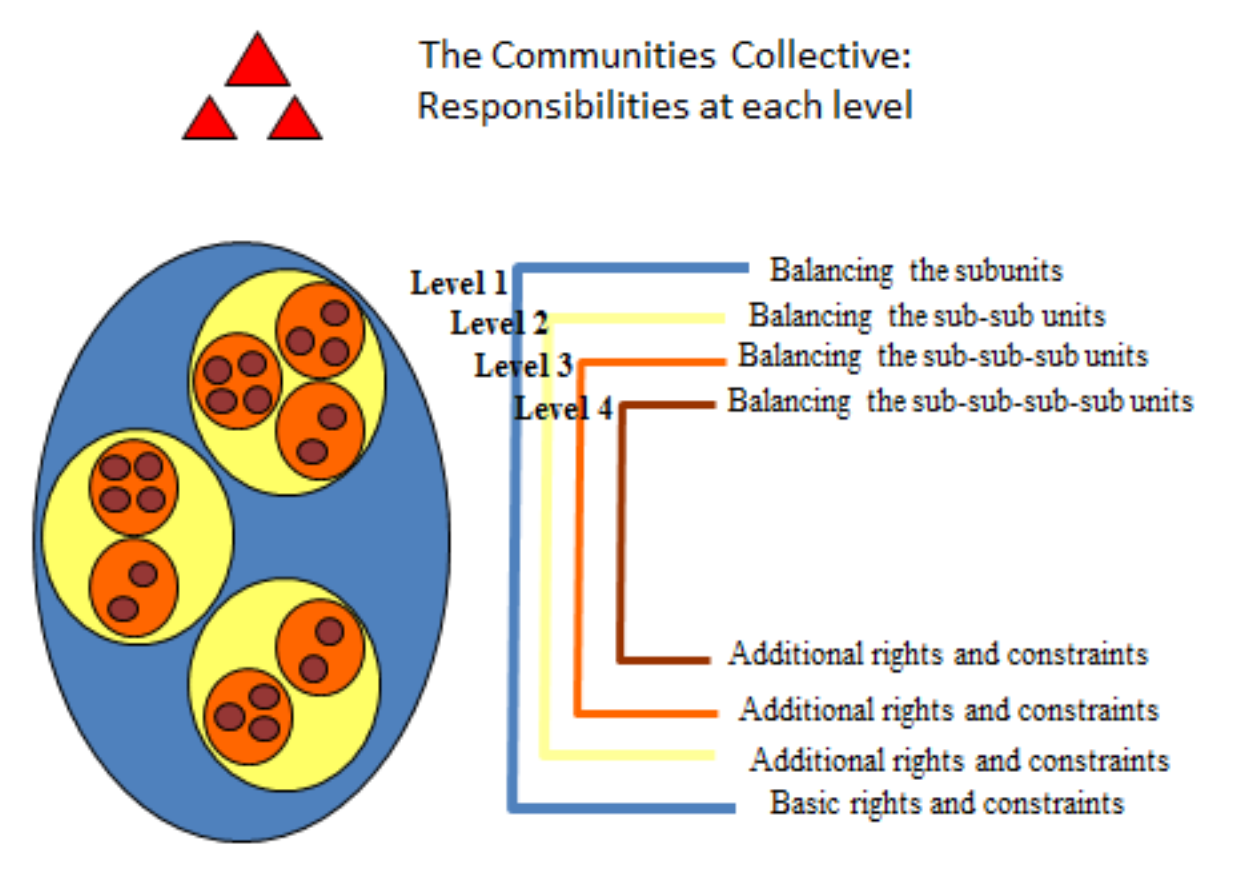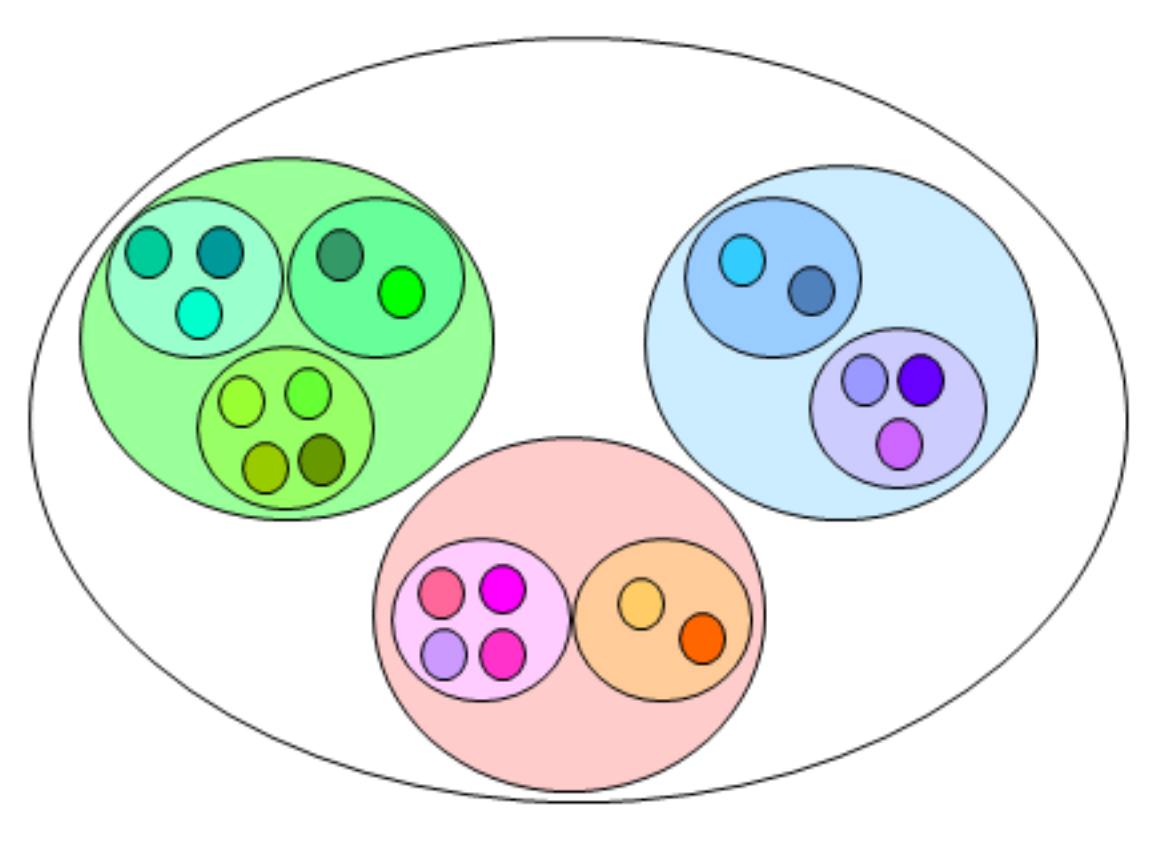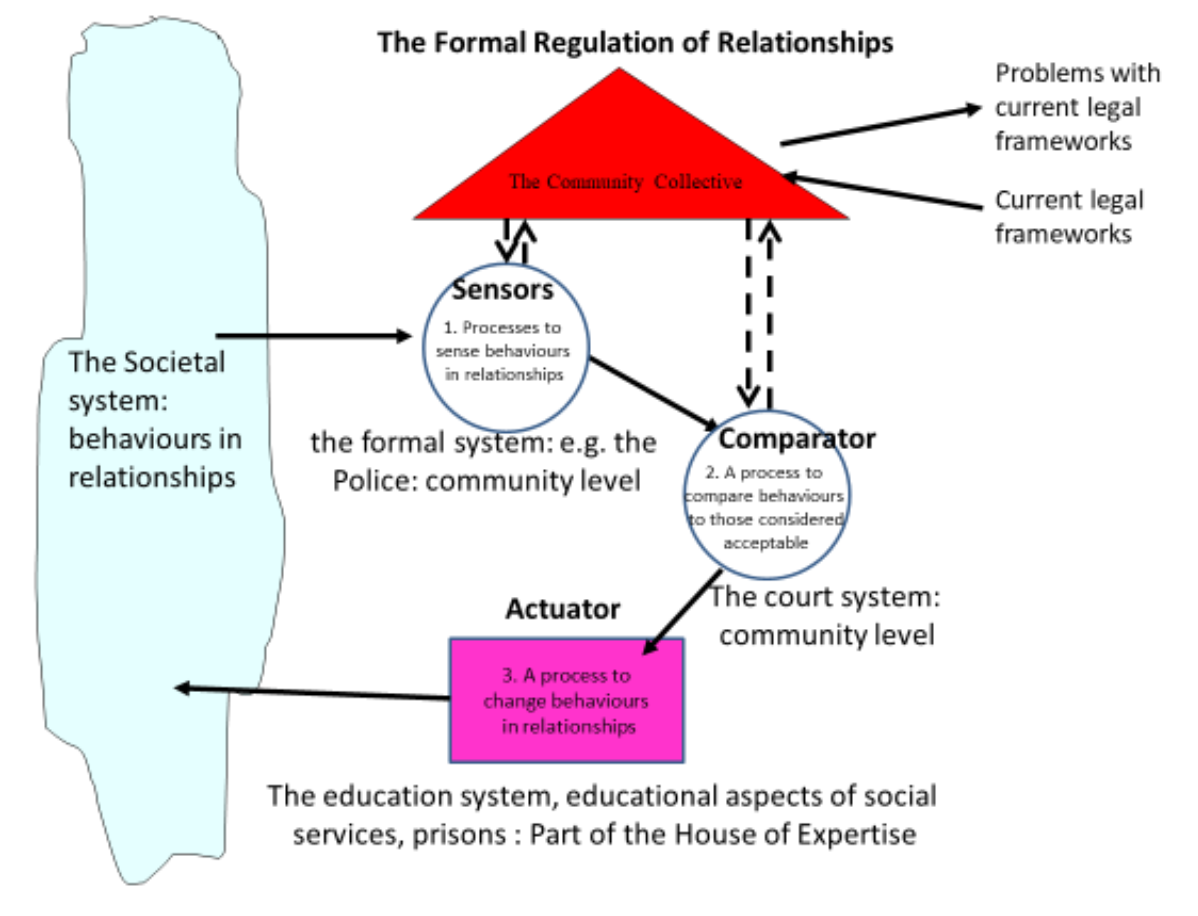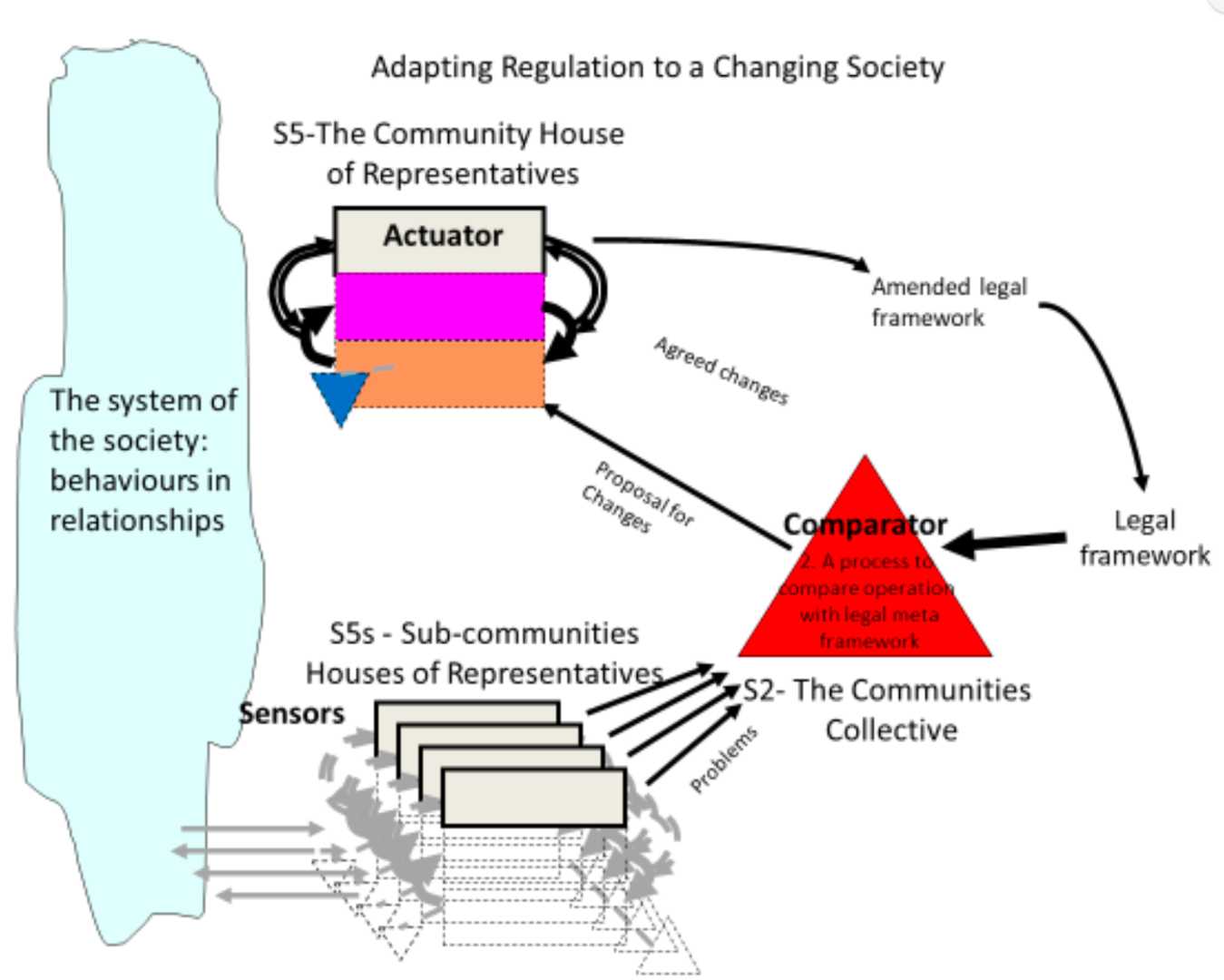# The Community Collective
In sections 5.4 and 5.5 I explored achieving coherence between a group of sub- systems, applying the Sub-optimisation Theorem, the last of the three cybernetic rules which apply to all managing situations. It shows that in order to optimise any variable for the whole system, sub-systems must be prevented from optimising that variable for themselves in isolation from other sub-systems. This is achieved by imposing a frame within which they must work which enables the co-operation necessary to bring coherence to the whole. For example it is well understood in the world of soccer that having a prima donna in your team does not lead to a high performing team. But, it does not seem to be generally understood in the world of government that in states with high inequality both economic and social development are damaged (Piketty 2020). It is to be expected that if organisations or sub-communities are allowed to maximise their own well-being then overall well-being is damaged.
For a community preventing sub-optimisation splits into two parts, the first, maintaining the structure of the community: that is maintaining the economic balance between the sub-communities - enabling necessary change in boundaries between sub-communities, maintaining cohesion through trading relations, building of new organisations for a changing environment. The second part is the development and maintenance of the underlying framework of rights and responsibilities that applies to all people and organisations within the community. These two ongoing tasks and their interlocking nature are illustrated in Figure 8.7. 15

Figure 8.7: The purposes of the Community Collective
Figure 8.7: The purposes of the Community Collective
In Chapter 5 I used government as the principle example in showing that a whole community must develop and manage a minimal frame within which sub-communities at the next level must adhere if it is to avoid the problems of sub-optimisation. Each sub- community can add additional constraints to the minimal frame but not take anything from the constraints imposed.
Government creates laws which describe rights and constraints. The impact of the governing rules on rights and constraints on me, a member of the community, or on an organisation serving the community is to indicate that there are some things that I can do and some things that I can’t, some things that can be done and some that can’t. It is this that forms the frame of acceptable things that can and can’t be done. This frame deals only with things of relative importance, for example it says that I can’t take things for my own use that others habitually use, and I shouldn’t kill anyone. They protect me from having my tools stolen, or from being killed. The regulations act in both directions limiting how I affect others and how others affect me. It doesn’t say that I should only use a circular–ish spoon for eating soup rather than an oval shaped one, although such cultural regulations do exist. So in any society there are some regulations that are informal, and some that are formally enshrined in law, but all change and evolve with time. As Piketty (2020) argues the framing within which we live our lives is largely constructed by the stories we tell ourselves. There are always many more options for developing the formal legal structures than those which are adopted, and they are adopted because they seem to be the obvious solution dictated by the current framing narratives.

Figure 8.8: An illustration of the layered structure of the internal governing frame
Figure 8.8: An illustration of the layered structure of the internal governing frame
The situation for a government is yet more complex. Whilst a government is concerned with relationships, it is not just those between individuals. In any community there are in addition to relationships between members of the community, relationships between organisations in the community, and relationships between members and organisations. Just as in many ecosystems there are organisations present in some communities that operate at a larger community level. In the ecology of the planet, a large tree, or a top predator operates across many ecosystems, and modifies or even creates ecosystems within its influence range. There are many business organisations which span geographic communities and even create geographic communities in similar way. Employees, and supplies are drawn from a range of communities and products and services are also distributed and used across a range of communities. The three ranges are not necessarily the same. In our current world nations suffer from business organisations playing nations against each other, this points to a need for a world frame. The agreed frame across sub-communities at all levels is of utmost importance to eradicate this behaviour, and this leads to the conclusion that the frame governing 17 the standards which apply to an organisation must be set at the level which encompasses all its operations.

Figure 8.9 The formal community regulation system
Figure 8.9 The formal community regulation system
These frames are control systems as I discussed in Chapter 5. The first aspect of the community control system is social regulation of relationships. This could be someone detected behaving badly and being told, or losing friendship, or an organisation behaving badly and losing custom. There are many examples of ways in which people themselves act as sensors, comparators, and actuators in changing their own behaviour in an endeavour to put pressure on miscreants to change theirs. The formal system, that is the legal system, is illustrated in Figure 8.8. The formal system picks up the problem when a matter is serious enough to be reported to the police or other regulatory body, who then have the duty to investigate and bring a formal charge of transgressing the legal framework. The court system has the duty to compare the model of the situation produced by the investigation with the accepted framework standards. If it is found that the framework has been transgressed then sanctions will result. These sanctions are of little value if the behaviour of the transgressor does not change. Therefore the sanctions must include the purpose of changing the models which guide the behaviour of the miscreant. This is the actuator which brings about the change and corrects or should correct the bad behaviour.
As a society evolves, so must the formal legal system. When a problem is perceived with the operation of the current sub-communities framework the sensors, comparator, and actuator, subsystems of the Community Collective, and part of the Executive has a duty to bring problems to the ongoing discussion between the Community Executive and the community House of Expertise. It is important here to remember the levels’ relationships, the community sets the frame for its sub-communities and may change 18 that frame. A community cannot change the frame within which it sits but can of course bring problems to the attention of the meta-community collective. Building on Figures 5.2 and 5.3 and Figure 8.6 I come to Figure 8.8 describing the necessary control system to effect changes in cybernetic terms and in terms of the proposed democratic system.

Adapting Regulation to a Changing Society
Beer’s conception of the Viable System Model (VSM) proposes that there is ongoing feedback communication between System 2’s, i.e. the Community Collectives, between levels. Therefore the collectives themselves form a fractal structure. This fractal structure will include the operational subsystems of the Community Collectives, that is the court system and judiciary on the one hand, and the police and other behavioural formal sensors on the other. Both these should also be fractal structures but needing further analysis to see how far from that they are now, and of course they have their own governing frameworks.
The situation that Forrester describes in the quotation at the head of this Chapter has changed little in the years since 1970, although now Piketty has gathered a considerable weight of evidence on the practice that has been tried and suggests in his book possibilities to investigate(Piketty 2020). I suggest that applying systemic logic should also be a guide on the path to better governing. A governing system is a system to regulate relationships. Relationships are the interconnections between things, very much the subject matter of systems thinking. Governing is a process of holding steady in a changing world, and the subject matter of cybernetics, exactly as both Plato and Ampere envisioned. What is surprising is that this approach seems entirely absent from the literature on governing, even from most current writing. When I analyse the workings of the United Kingdom government, the one I know the best, it accords to none of the three cybernetic laws, nor with the best practice of ensuring the well-being of all citizens or achieving right relationship to the natural world. Human society and its 19 relationships to the natural ecosystems of the planet is a hugely complex system, therefore, it seems to me that any attempt to analyse and discuss governance in any conceptual system other than a process systemic conceptual system is doomed to failure.
Most of us I would imagine wish to live in peace, without harming others, not being caught up in the stories which competing elites create to further their position, and being able to get on with our chosen lives. We need the communities in which we live to survive and be reasonably prosperous so that we can maintain our own livings. Those we elect to positions of governing, our representatives, have firstly the task of living in and listening to the society they represent. Societies change over time, and the stuff of government - constitution, laws, regulations - must change with it. Representatives have the task of using their knowledge and understanding to translate the changes into amendments to the stuff of government. This stuff of government should ensure that we can live in peace, without being harmed by others and to help maintain all the members of its communities. At root then, the task of our representatives is to ensure that the values of the society are reflected in the laws and regulations, and that all have the possibility of a decent living. This is the purpose of managing a society.